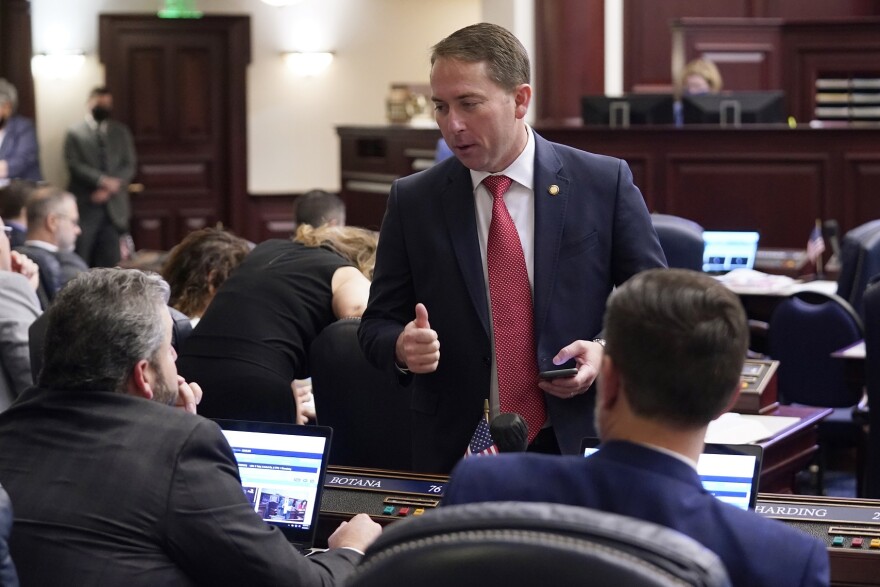A legislative budget panel this week gave Gov. Ron DeSantis millions more dollars to pump into storm recovery projects, two weeks after category 4 Hurricane Ian landed in Southwest Florida and crossed the state.
Emergency managers say the state is still in a storm-response phase.
In an emergency meeting, the Joint Legislative Budget Commission approved adding $360 million to the Emergency Preparedness and Response Fund. The fund was established this year with $500 million. It’s a pool of cash the governor can access without getting approval.
“Throughout the whole state of Florida, devastation is so severe. I am concerned still, even though you have said you think that will be enough, that we should have transferred more money," said Sen. Linda Stewart, D-Orlando. "I guess if we're not going to go beyond the $360 million, we'll just have to meet again. Is that how you see it?”
“Thank you, Senator Stewart. I believe yes, this is what everyone has agreed at this point would work," replied Sen. Kelli Stargel, R-Lakeland, co-chair of the commission. The Governor's Office requested that amount, and Stargel said they could call another meeting if needed or consider adding money during the next legislative session.
Florida is approved to receive 100% of Ian recovery costs for 60 days from the federal government.
With attention on Ian recovery, parts of the panhandle are not back to normal, 4 years after Hurricane Michael made landfall as a category 5 storm.
“It's heartbreaking. It brings back all of those memories,” says Rep. Jason Shoaf, R-Port St. Joe. His district includes North Florida counties that got walloped by Michael.
"We're still recovering, and it's hard for people to realize that -- the amount of time and effort and blood, sweat and tears that go into a hurricane recovery of this magnitude," Shoaf says. "The psychological impact, the economic impact, just all the way across the board. You have generations of families that move away and don't come back. So the impacts are, they're near impossible to quantify.”
Shoaf has requested millions of dollars from the legislature in the years since Michael for storm recovery projects. He says there is much more to do, like hardening the infrastructure, and he says panhandle residents are still dealing with insurance companies.

“Insurance claims were the worst part of the post-Michael life," Shoaf says, adding his office is working with constituents "that are still in litigation over damages and payouts from insurance from Hurricane Michael. So our friends in southwest Florida are about to go through this, unfortunately.”
The Florida Legislature held a special session last May to pass laws addressing problems in the property insurance market. Changes include cracking down on fraudulent roof claims and prohibiting insurers from denying claims without providing a sufficient reason. Shoaf says more work is needed, and it won’t be an easy fix.
“We have to make it where the insurers are solvent. They have to make a living, otherwise they will leave the state, and that's kind of where we are now. So we'll be looking at ways to make sure that these insurance companies can function," Shoaf says. "We're also looking at...how do we take away some of these frivolous lawsuits? As the legislature, we have to go in and make sure that the rules for the game are clear and that, you know, the field of play is level and inviting to these companies.”
Shoaf says Michael's victims are not forgotten even though the state has suffered another major blow from a powerful hurricane; and when the next big storm is bearing down on Florida, he says having a plan can be the difference between life and death.
"For me, the biggest lesson learned is be prepared. Make sure everyone that you know and love are taken care of," Shoaf says. "Then when the storm passes, go check on your neighbors and go help them. That's what we're called to do.”
As of Oct. 14, 109 deaths in Florida are attributed to Hurricane Ian. Deaths were reported in 17 counties, most of them in Lee (54). Florida District Medical Examiners report hurricane deaths to the Medical Examiners Commission following examinations and confirming the death is storm-related. FDLE staffs the Florida Medical Examiners Commission.
The Florida Office of Insurance Regulation website shows more than half a million insurance claims have been filed since Ian made landfall September 28.
The News Service of Florida contributed to this report.
Copyright 2022 WFSU. To see more, visit WFSU.







